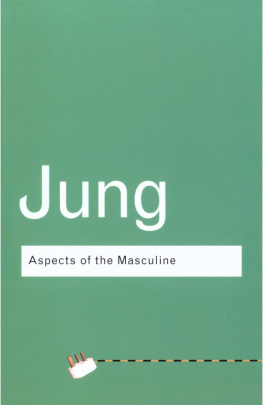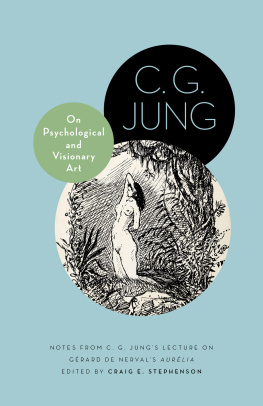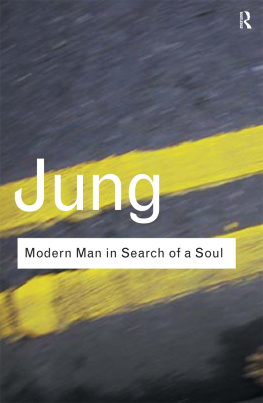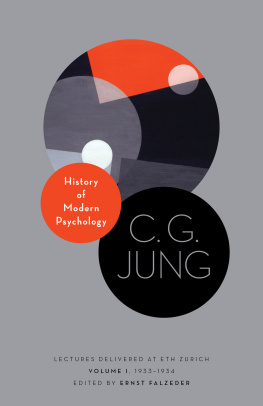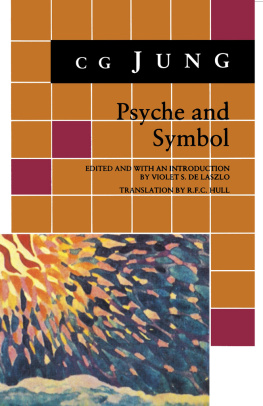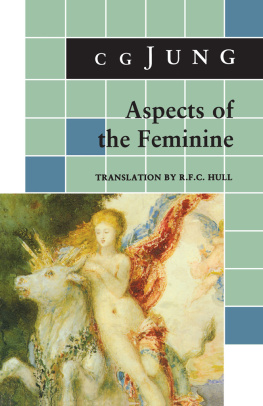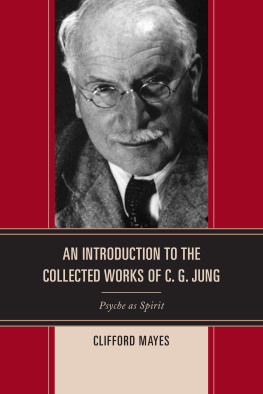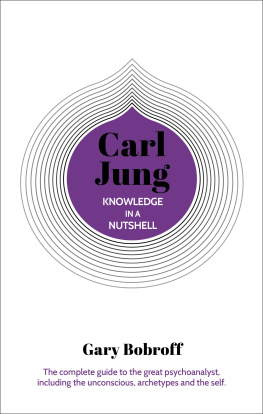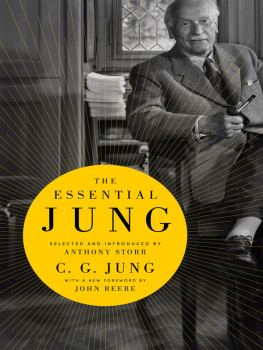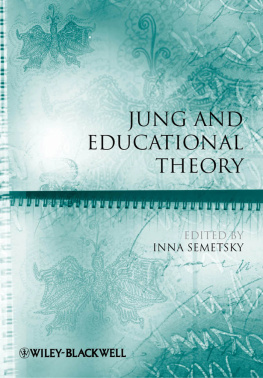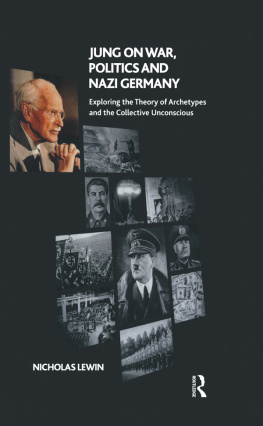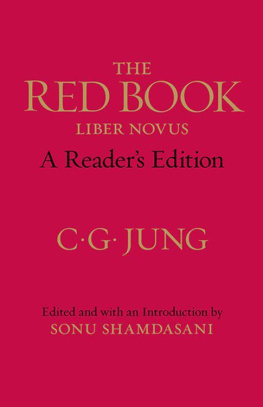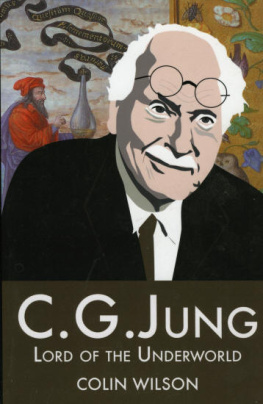Aspects of the Masculine
The Editors insightful introduction and careful selection of Jungs papers are invaluable in enabling the interested reader to trace Jungs personal quest on the path to the discovery of his own masculinity through his writings on the Hero; the personal and collective unconscious; the Stages of Life; the personification of the opposites; anima/animus; Mercurius and alchemy.
Ann Casement, Analytical Psychologist and Anthropologist
He was on a giant scale he was a master physician of the soul in his insights, a profound sage in his conclusions. He is also one of western mans great liberators.
J. B. Priestley
Jung was probably the most significant original thinker of the twentieth century.
Kathleen Raine
Carl Gustav
Jung
Aspects of the Masculine
Edited with an introduction by John Beebe
Translated by R. F. C. Hull

First published in the United Kingdom 1989
by Routledge & Kegan Paul
First published in the USA 1989
by Princeton University Press, Princeton
First published in Routledge Classics 2003
by Routledge
2 Park Square, Milton Park, Abingdon, Oxon, OX14 4RN
Routledge is an imprint of the Taylor & Francis Group, an informa business
Selection 1989 Princeton University Press
1989, 2003 Estate of C. G. Jung
Typeset in Joanna and Scala Sans by RefineCatch Limited, Bungay, Suffolk
Extracts from the Collected Works of C. G. Jung: The Origin of the Hero and The Battle for Deliverance from the Mother, Volume 5, Symbols of Transformation, 1956 Bollingen Foundation, Inc. The Stages of Life, Volume 8, The Structure and Dynamics of the Psyche, 1960 Bollingen Foundation; second edition 1969 Princeton University Press. On the Psychology of the Unconscious and The Personal and Collective Unconscious, Volume 7, Two Essays on Analytical Psychology, 1953 Bollingen Foundation, Inc.; new material 1966 Bollingen Foundation. The Love Problem of a Student, Volume 10, Civilization in Transition, 1964 Bollingen Foundation; second edition 1970 Princeton University Press. The Significance of the Father in the Destiny of the Individual, Volume 4, Freud and Psychoanalysis, 1961 Bollingen Foundation. The Personification of the Opposites, Volume 14, Mysterium Coniunctionis, 1963 Bollingen Foundation; second edition 1970 Princeton University Press. Concerning the Archetypes with Special Reference to the Anima Concept and The Phenomenology of the Spirit in Fairytales, Volume 9, i, The Archetypes and the Collective Unconscious, 1959 Bollingen Foundation, Inc.; new material 1969 Bollingen Foundation. The Spirit Mercurius, Volume 13, Alchemical Studies, 1967 Bollingen Foundation.
ISBN13: 978-0-415-30769-7 (pbk)
Extracts from other sources: Lecture VIII, 13 March 1929, Dream [12] and Lecture V, 19 February 1930, Dream [23], Seminar on Dream Analysis, 1984 Princeton University Press. Letter of 12 November 1957, Volume II of C. G. Jung: Letters, 1975 Princeton University Press. Letter of 26 August 1943, Volume I of C. G. Jung: Letters, 1973 Princeton University Press. The Houston Films ( 1964 and 1976 Richard I. Evans) and Esther Hardings Notebooks ( 1975 C. G. Jung Foundation for Analytical Psychology, Inc.), C.G. Jung Speaking, 1977 Princeton University Press.
All the volumes composing of the Collected Works constitute number XX in Bollingen Series, under the editorship of Herbert Read, Michael Fordham, and Gerhard Adler; executive editor, William McGuire. Seminar on Dream Analysis, Bollingen Series XCIX, edited by William McGuire. C. G. Jung: Letters, Volumes I and II, Bollingen Series XCV, under the editorship of Gerhard Adler and Aniela Jaff, and translated by R. F. C. Hull. C. G. Jung Speaking, Bollingen Series XCVII, edited by William McGuire and R. F. C. Hull.
All rights reserved. No part of this book may be reprinted or reproduced or utilized in any form or by any electronic, mechanical, or other means, now known or hereafter invented, including photocopying and recording, or in any information storage or retrieval system, without permission in writing from the publishers.
British Library Cataloguing in Publication Data
A catalogue record for this book is available from the British Library
ISBN 10: 0-415-30769-4
ISBN 13: 978-0-415-30769-7
CONTENTS
To understand what C. G. Jung means by the masculine is to gain access to the ground of his entire approach to psychology, for his psychology, as he liked to admit, was his personal confessionthe confession of a man seeking to understand human psychology in the patriarchal context of a private practice in a western European country in the first half of the twentieth century. Not even the demonstrable universality of the archetypal world that he uncovered in this endeavor could eliminate the human standpoint of the pioneer, who remained a man telling us what his experience had been. Therefore the present collection of excerpts from his writings affords an opportunity to discover what Jung himself understood of the contribution that gender made to his personal equation, a chance to look at the lens of the telescope through which he made his famous and far-reaching observations of the major psychological constellations.
Surprisingly, with the exception of the very early essay, The Significance of the Father in the Destiny of the Individual, written when he was still a Freudian psychoanalyst, there is no single published work in which Jung devotes himself exclusively to either the psychology of men or the broader unconscious psychology of the masculine. There is neither a monograph detailing a mans process of psychological development nor an essay devoted to the animus, the masculine archetype that Jung interpreted for women as their soul-image. One has to pick ones way through many essays to uncover the thread of meaning that conveys Jungs own masculine path through the labyrinth of the unconscious. The present selection, though far from the only one possible, is an attempt to reveal this thread to the reader who wants to follow Jungs track.
The path unfolds from Jungs own childhood experiences in a vicarage as the son of a pastor who was losing his faith and the confidence of his wife and son. Paul Jung was both blocked and incapable of the kind of self-reflection that could have unlocked his spirit; for the child Jung, with his enormous potential for psychological development, this father was an unsatisfactory figure with whom to identify. In his extraordinary imaginal autobiography, Memories, Dreams, Reflections, Jung gives us a glimpse of the degree to which he had to found his own identity upon a private vision of the numinous power of the masculine. This vision of archetypal masculinity was of the kind that comes to a child who has at hand no human role model to incarnate the archetypal image and mediate its power and meaning:
I had the earliest dream I can remember, a dream which was to preoccupy me all my life (when) I was between three and four years old.
The vicarage stood quite alone near Laufen castle, and there was a big meadow stretching back from the sextons farm. In the dream I was in this meadow. Suddenly I discovered a dark, rectangular, stone-lined hole in the ground. I had never seen it before. I ran forward curiously and peered down into it. Then I saw a stone stairway leading down. Hesitantly and fearfully, I descended. At the bottom was a doorway with a round arch, closed off by a green curtain. It was a big, heavy curtain of worked stuff like brocade, and it looked very sumptuous. Curious to see what might be hidden behind, I pushed it aside. I saw before me in the dim light a rectangular chamber about thirty feet long. The ceiling was arched and of hewn stone. The floor was laid with flagstones, and in the center a red carpet ran from the entrance to a low platform. On this platform stood a wonderfully rich golden throne. I am not certain, but perhaps a red cushion lay on the seat. It was a magnificent throne, a real kings throne in a fairy tale. Something was standing on it which I thought at first was a tree trunk twelve to fifteen feet high and about one and a half to two feet thick. It was a huge thing, reaching almost to the ceiling. But it was of a curious composition: it was made of skin and naked flesh, and on top there was something like a rounded head with no face and no hair. On the very top of the head was a single eye, gazing motionlessly upward.
Next page
